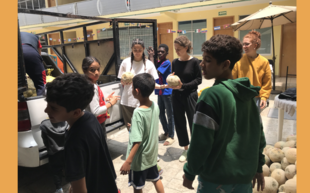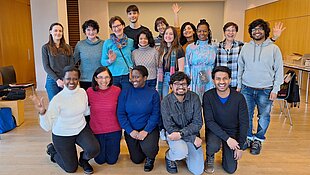Solidarity with refugees based on equality
We can hardly imagine what a person who had to leave her homeland carries within herself. The direct encounter with people, their faces and stories call us to get involved with the others. It provokes us also to question ourselves, to grow in the responsibility, to work for a new coexistence. Not we and you but we all. Not for them, not for him/ for her but with one another – for one another.
We asked Béatrice, Scalabrini Lay Missionary, daughter of Italian migrants, born and raised in France to share with us her experience with the refugees she meets every day in Switzerland in Solothurn and Bern.
Every day I meet people who had to leave their homeland. They are like a magnifying glass: they bring closer what is happening in different countries of the world.
Several times Pope Francis has said that we are experiencing a world war in sections. Behind them are conflicts, political and economic problems. The media report daily from men, women and children who arrive on the coasts of Europe. Often they are described as "invaders", "illegals", sometimes as "poor" or "desperate" ... They are human beings who take a dangerous, difficult way.
Why? I often ponder on this question. Sometimes I ask them directly. But mostly I try to put myself in their shoes: ... and if I were them? And what if we were them? I suggest that we set out together.
Let us imagine: we are in the capital city of Iraq. After the Eucharistic celebration in the Joseph’s church, we go back home. Above our door we find an Arabic "N" for Nazarene. This is how Christians are called. In the same night, armed people enter our house. They give us four options: pay a protective tax, convert to radical Islam, escape or die by the sword.
We decide to flee. We have no time to say good-bye to our relatives, to pack the suitcase. We do not know where to go. There are no legal escape routes. There is no other way but to entrust ourselves to smugglers.
We arrive somewhere in a camp. Time stands still. No one knows when something is going to happen. Then suddenly everything goes very fast. Ascend, be loaded, sit down, be driven in a new place, put our fate into the hands of a new unknown. We arrive in Libya and reach the Mediterranean coast.
There we meet men, women and children from different countries. They also have escaped death several times. On the Mediterranean the stormy ride takes three days and two nights, without food and only with little drinking water mixed with diesel. We can do nothing but trust God. We pray and sing psalms. We turn to God with the request to protect our lives, to realize our desires for life and for the future, for which we have put everything at risk.
Not all refugees arrive but most of them have made the experience just described. As soon as they arrive in Switzerland, they start from scratch, with a different language and writing, in a country where they are foreigners.
Some refugees invited me to participate in their prayers and celebrations. This is how I was able to get to know the Catholic Eritrean community.
In their worship services, they thank God for the gift of life, and they pray for those who have stayed behind in their homeland, or have perished in the sea or in the desert. They pray for those who have done them good, but also for those who have inflicted them sufferings. They listen to the Word of God and receive the Eucharist to gain new strength.
The human family to which we belong is affected by serious conflicts and injustices, resulting in ever-new migrations and people fleeing.
Basically, we know that conflicts between peoples arise in the same way as conflicts in our human relations. This also means that depending on how we live interpersonal relations, we can also promote peace.
It is important to discover that we are underway. As natives we are always in a position of power anyway. Consciously or unconsciously, we inevitably look at the stranger with certain superiority.
We need places and experiences that help us realize that we are on the way to discover our deeper identity as children of God. - Migrations give us a chance to meet and arouse in us the awareness of belonging to the one human family.
When we become more aware of this, much can change: the relationship to our own country, our property ... to those who come from other countries. Only then do we look at the others, at the strangers and refugees with new eyes, like God looks at mankind. This is the beginning of a genuine welcoming attitude, an effective openness ...
We need workshops in which we practice such relationships. There are experiences that show us that it is possible. From them we draw courage and hope.
I experience this for example in the Scalabrini Center in Solothurn, where young people meet. Some were born in Switzerland, others have a migration background, others have fled to Switzerland. Here is the experience of two of them.
In this encounter we realized that the search for a meaningful life, for real relationships, connects us with God. He enables us to share what each person brings and is. Everything can become a gift for the other: poverty and wealth, joy and pain, insecurity and security. Then we are no longer focused on our problems, but we become more open to listen to the others and to discover that we are a family (Simon, Swiss).
The young Christians from Iraq and Syria have particularly impressed us. They left their homeland because of religious persecution. Even when their own life was at stake, they could not and would not give up their faith. Their wish for freedom, their joy, faith in Jesus Christ, has challenged us. We can live without fear of persecution, but consumerism and materialism often cover the search for the real meaning of our lives. Together we asked ourselves: how can we grow in our faith? How can we pass it on, even if times we have the impression that there is no interest? (Laura, Italian).
There is no easy answer to this question. But one thing is certain: in relationships with others, in communion, it is possible to live our faith and give testimony of it in our daily life.
by the editorial staff
Similar blog articles

01.12.2024
CDMX
CIMS Mexico City, Young people
Mission Exposure in Messico
Sofia, Elisabetta e Caterina, grazie al Progetto Mission Exposure (MEX) dell’Università Cattolica di Milano in collaborazione con il PIME, hanno trascorso un mese a Città del Messico, nel Centro Internazionale Scalabrini, svolgendo il loro servizio tra i migranti.
Read more
31.03.2024
Stuttgart
CdS Stuttgart, Church, Young people
Monatstreffen im Centro di Spiritualità
„Kommt und ihr werdet sehen“ (Johannes 1,35-42a)🗝
„Come and you will see“ (John 1:35-42a)🗝
31.01.2024
CD México
CIMS Mexico City, Young people
Encuentros internacionales en el CIM-S
Centro Internacional Misionero Scalabrini
